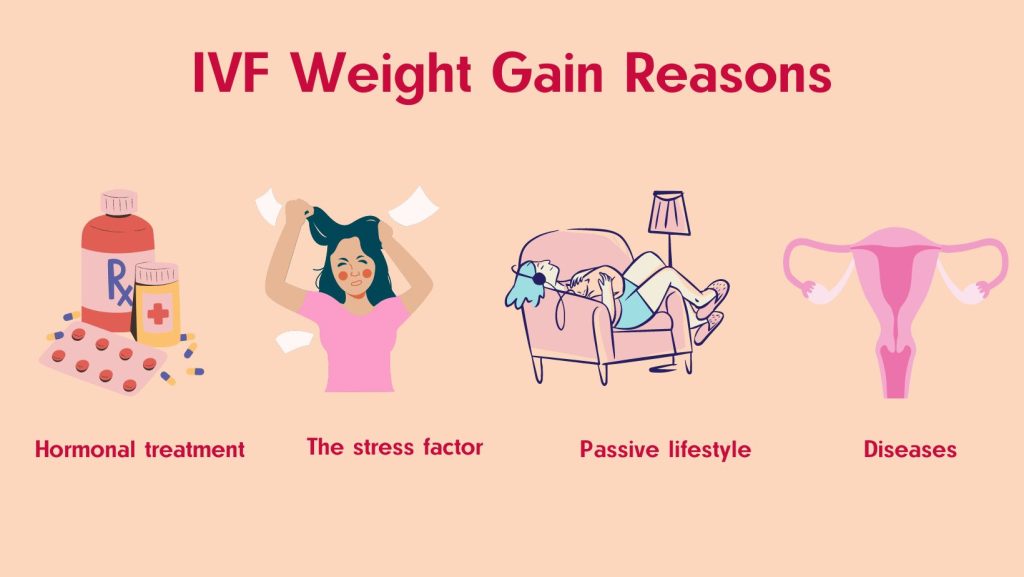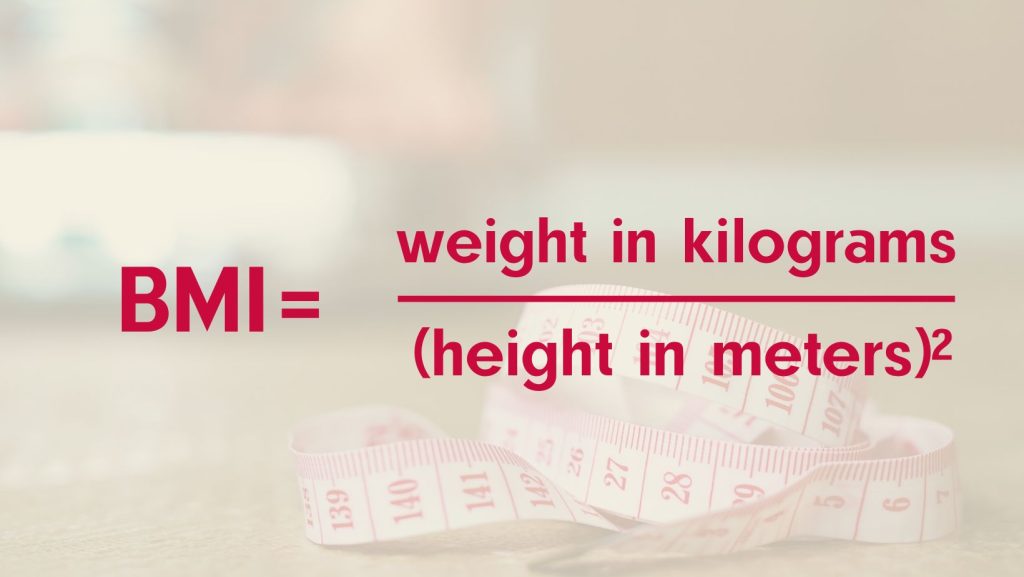IVF Weight Gain – Does IVF Cause Weight Gain, & How to Normalize Your BMI?
IVF weight gain is an increase in body weight during ovarian stimulation or after egg retrieval. It occurs due to hormonal imbalance, stress, or an unhealthy lifestyle and may be a sign of pathologies.

Many women who undergo IVF are acutely concerned about potential weight gain and wonder how to avoid it. Today, we will consider whether it is true that treatment causes mass augmentation, why it can happen, and how to lose excess pounds.
Does IVF Make You Gain Weight?
We often come across the stereotype that IVF causes gaining weight. However, it is not 100% true.
Indeed, some women experience weight changes and visual swelling during the program. It is due to hormonal fluctuations causing some fluid retention in the body due to controlled stimulation rather than IVF itself.
In rare cases, if the excess reaches 15-20 pounds, it should be a cause for concern. Excessive mass complicates the procedure of egg retrieval, affects the quality of eggs, and causes complications during pregnancy.
One should also remember that weight increase during the stimulation phase can signal ovarian hyperstimulation syndrome, which requires medical supervision and treatment to prevent complications.
In a nutshell, this complication is a real thing in some cases. However, it is associated with a hormone dosage of IVF injections or concomitant conditions. Let’s take a closer look at all the reasons.
IVF Weight Gain Reasons
Based on our egg donors’ and intended parents’ experience, we identify the following causes of IVF weight gain.

Hormonal Treatment
During ovarian stimulation, women receive injections that influence the body differently. For example, progesterone increases appetite, which can lead to overeating and, as a result, mass gain. Changes in levels of leptin, insulin, sex hormones, and growth hormones also influence metabolism. It causes the accumulation of fat, especially in the abdomen. Another case associated with injections is fluid retention, which causes temporary swelling.
Stress Factor
Although the hormone program is not supposed to be stressful, some women experience anxiety and excessive worry. It is especially true when things are not going as planned, e.g. the cycle changes or treatment needs to be adjusted. It leads to the release of cortisol, a ‘stress’ hormone that also contributes to rapid IVF weight gain. Also, some people resort to emotional eating when under pressure. We have some tips on how to avoid stress and stay calm about pregnancy.
Passive Lifestyle
We recommend that patients refrain from intense physical training and avoid exercising the abdominal and back muscles during a program. However, they should continue active living and moderate exercises. A sedentary lifestyle may be the reason for excess calories. They are stored in the body and converted to fat.
Ovarian Enlargement
The stimulation process is aimed at developing 10-12 oocytes, not just one, as in the natural cycle. It affects the size of the ovaries. As the follicles grow, they become larger and may cause bloating.
OHSS
One of the signs of OHSS (ovarian hyperstimulation syndrome) is a rapid and sudden mass increase due to fluid discharge into the abdominal cavity. If you see an extra 15-20 pounds on the scales, contact your doctor immediately to determine the nature of this change and prevent negative consequences.
How to Avoid Weight Gain during IVF?
There are several ways to prevent IVF weight gain. We advise patients to follow these rules to avoid gains on the scales:
- Keep a healthy diet. A healthy diet improves fertility and allows you to control your mass during the program. Eating enough vegetables, fruit, cereals, healthy fats, and proteins is the key to staying fit. In addition, it is crucial to drink plenty of water to remove fluid from your body. We have developed a healthy meal plan for your next IVF program.
- Stay active. Of course, you should avoid heavy physical activity during stimulation. However, it does not mean that you should lead a passive lifestyle. Walking in the fresh air, yoga, and morning exercises will help you lose calories and maintain a reasonable weight.
- Follow a daily schedule. It is critical to organize your sleep and activity hours. This way, you will get enough energy at night from a healthy sleep and spend it during the day. It also applies to meals, which should be scheduled.
Obese Women Consequences
Excess pounds negatively affect fertility and complicate fertilization. It applies not only to natural pregnancy but also to IVF. How does it manifest itself in virto fertilization? We can cite several of the most common consequences.
Deterioration of oocyte quality
Due to excess fat, the level of cholesterol, glucose, and triglycerides increases. Against this background, the quality of oocytes deteriorates. Also, obesity harms the endometrium and leads to a decrease in the number of eggs.
Increasing doses of hormones
For overweight recipients, stimulation treatment can give worse results because the active substances immediately go to the fat depot. So, overweight women require higher doses of hormones for the growth and development of follicles.
Problems with egg retrieval
Egg retrieval is carried out by the puncture. During this procedure, a needle is inserted vaginally or transabdominal to reach the eggs. However, the excess fatty tissue of the pelvis pushes the ovaries too high from the upper part of the vagina. It is a stumbling block for the safe insertion of the egg retrieval needle.
Complications with ultrasound
It is difficult to visualize the ovaries and follicles if there is too much tissue between the probe and the ovary. Because of this, it is hard to control the number and stage of follicle development according to the growth chart.
IVF Weight Limit
When determining limits for a program, the decisive factor is not the number of pounds but the body mass index, or BMI. The woman can undergo a program if it does not exceed a BMI of 30. Otherwise, we advise patients to lose weight first and only then plan conception. It is a necessary measure that ensures safe stimulation and embryo transfer.
What is BMI?
Body mass index (BMI) is the ratio of weight and height that objectively assesses whether the mass is insufficient, normal, or excessive. It allows you to determine whether you are thin or obese, depending on the range in which the BMI value falls. Of course, the value obtained does not always indicate a deviation. However, it is a reason for further examinations to detect diseases at early stages.
How to Calculate My BMI?

You need your height and weight measurements to calculate your BMI.
The formula is: BMI = kg/m2
- kg is weight in kilograms
- m2 is height in meters squared.
BMI Calculator
It looks something like this. Let’s say you are 1.70 meters tall and weigh 68 kg. First, let’s multiply 1.7 by 1.7 to square the value. We get 2.89. Then divide 68 by 2.89 and get your BMI – 23.5.
The BMI classification will help you analyze the result.
| BMI Range | Classification |
|---|---|
| Below 18.5 | Underweight |
| 18.5 - 24.9 | Normal |
| 25.0 - 29.9 | Overweight |
| 30.0 - 34.9 | Obesity (Class 1) |
| 35.0 - 39.9 | Obesity (Class 2) |
| 40.0 and above | Obesity (Class 3) - severe obesity |
Remember that body mass index is not an accurate indicator of abnormalities. To analyze your condition and your readiness for treatment, consult a fertility specialist.
How to Lose Weight during IVF?
You can initiate a simulation if your body mass index and other indicators are within the normal range. However, after starting treatment, we do not recommend losing weight, as this threatens the patient’s fertility and health. During the program, you may keep your body at a constant level by following a healthy diet and daily routine.
After the cycle, stimulation, or the birth of a child, you can begin recovery. It is challenging due to an imbalance of hormones, so we recommend doing everything gradually without sudden stress. You may use the following training plan.
| Day | Activity | Duration | Notes |
|---|---|---|---|
| Monday | Brisk walking | 30 minutes | Start with a moderate pace |
| Tuesday | Rest | - | - |
| Wednesday | Yoga | 30 minutes | Emphasize flexibility and relaxation |
| Thursday | Swimming | 20 minutes | Low-impact and easy on the joints |
| Friday | Rest | - | - |
| Saturday | Gentle stretching | 20 minutes | - |
| Sunday | Rest | - | - |
Consult with a specialist to create an individualized exercise plan tailored to your body.
Chelsea Hansen about Her 90-Day Fitness Journey
If you have no complications after a program, pregnancy, and childbirth, you can start a fitness program. Chelsea Hansen started her 90-day fitness journey with specific goals and a workout plan.
By the time I launched IVF, I was 118 pounds. I weighed 128 pounds during my pregnancy. My goal is to lose 10 pounds. To realize my desire, I am doing intense yoga. I also have a marathon run of 26 to 28 miles planned.
You may follow the link to see the full story and results of the fitness journey.
What I Did to Lose Weight After Retrieval
Brittany shares her experience of losing weight after egg retrieval with her followers.
I experienced IVF weight gain of approximately 10 pounds. I began documenting my body composition in a video the day after the surgery. About a month later, I resumed filming to update you on my progress. I had returned to my initial fit! It took me approximately a month to shed the pounds gained during the egg retrieval phase.
In the video, the woman talks about her workouts and challenges while doing the exercises. You can watch all the details of the process here.
IVF Weight Gain FAQ
There is no reliable data that would confirm weight gain during egg freezing. However, this may occur due to hormone fluctuations during the stimulation before freezing.
Gaining 5-10 pounds is considered quite natural. It is nothing to worry about, as the weight comes off after the cycle is complete.
No. During hormone treatment, the body needs energy and balanced nutrition. We advise you to follow a healthy diet that limits only harmful foods and allows you to stay healthy and fit.
Final Thoughts
Generally speaking, IVF weight gain depends on the individual response to hormone treatment, stress, and lifestyle changes. By adjusting your habits and adopting a healthy lifestyle, you can avoid gains on the scales.
If you have any questions about individual risks, preparation for IVF, or a dietary regimen, don’t hesitate to contact our specialists. Sunshine Agency is always happy to give detailed consultation to dispel doubts and stereotypes about IVF and other procedures.